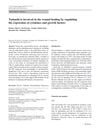44 citations,
December 2005 in “Journal of Investigative Dermatology” Certain genetic markers, especially the MICA gene, are linked to alopecia areata.
 42 citations,
March 2014 in “European Journal of Pharmacology”
42 citations,
March 2014 in “European Journal of Pharmacology” Ginsenoside F2 from ginseng may increase hair growth better than standard treatments by affecting cell growth signals.
 39 citations,
July 2016 in “Biomedicine & Pharmacotherapy”
39 citations,
July 2016 in “Biomedicine & Pharmacotherapy” Cedrol from Platycladus orientalis leaves may promote hair growth effectively, especially in female mice.
 38 citations,
January 2015 in “Journal of Cosmetic Dermatology”
38 citations,
January 2015 in “Journal of Cosmetic Dermatology” The nutritional supplement improved hair density and reduced hair loss in women with female pattern hair loss.
38 citations,
September 1997 in “The journal of investigative dermatology/Journal of investigative dermatology” A mutation in mice causes hair loss and skin issues due to a defect in a gene affecting cell adhesion.
37 citations,
December 2021 in “Cells” Alopecia areata severity and treatment response are linked to specific cytokine levels.
37 citations,
June 2004 in “Human molecular genetics online/Human molecular genetics” The HCR gene contributes to psoriasis risk.
 35 citations,
January 2017 in “Journal of Dermatological Science”
35 citations,
January 2017 in “Journal of Dermatological Science” Stress can cause early aging in certain skin cells, leading to problems with hair growth.
33 citations,
January 2001 in “Critical care clinics” Dietary lipids affect inflammation and are crucial for normal cell function and immune health.
 32 citations,
March 2021 in “Journal of cosmetic dermatology (Print)”
32 citations,
March 2021 in “Journal of cosmetic dermatology (Print)” COVID-19 infection may trigger alopecia areata in some patients.
 32 citations,
December 2009 in “Archives of Dermatological Research”
32 citations,
December 2009 in “Archives of Dermatological Research” Dihydrotestosterone increases certain inflammatory signals in skin cells, potentially contributing to acne.
 32 citations,
January 2008 in “Journal of Microencapsulation”
32 citations,
January 2008 in “Journal of Microencapsulation” Cosmetics with hinokitiol-loaded nanocapsules were found to effectively promote hair growth.
 29 citations,
March 2020 in “Stem Cell Research & Therapy”
29 citations,
March 2020 in “Stem Cell Research & Therapy” Fat stem cells from diabetic mice can help heal skin wounds in other diabetic mice.
28 citations,
October 2014 in “Development” Fz3 and Fz6 can partially replace each other in tissue polarity and axon guidance.
 28 citations,
November 2013 in “The journal of investigative dermatology/Journal of investigative dermatology”
28 citations,
November 2013 in “The journal of investigative dermatology/Journal of investigative dermatology” GMG-43AC may help reduce unwanted hair growth and treat certain hair loss conditions.
27 citations,
July 1997 in “PubMed” The harlequin ichthyosis mouse mutation causes thick skin and early death, resembling a human skin disorder.
 26 citations,
April 2019 in “Advances in wound care”
26 citations,
April 2019 in “Advances in wound care” Tannic acid helps wounds heal faster in rats by activating certain cell signals and reducing inflammation.
 25 citations,
January 2013 in “Journal of Industrial and Engineering Chemistry”
25 citations,
January 2013 in “Journal of Industrial and Engineering Chemistry” Some herbal extracts, especially when used in cubosomal suspensions, were as effective as Minoxidil in promoting hair growth.
 24 citations,
January 2003 in “Journal of Investigative Dermatology”
24 citations,
January 2003 in “Journal of Investigative Dermatology” Blocking a specific receptor slows down hair loss in mice.
 22 citations,
January 2014 in “Biological & Pharmaceutical Bulletin”
22 citations,
January 2014 in “Biological & Pharmaceutical Bulletin” Ginsenoside F2 may help prevent hair loss and promote hair growth better than finasteride.
21 citations,
January 2020 in “Pharmaceutical Biology” Salvia plebeia extract can stimulate hair growth.
 21 citations,
August 2014 in “Journal of Cell Communication and Signaling”
21 citations,
August 2014 in “Journal of Cell Communication and Signaling” Tsukushi helps control inflammation and aids in wound healing.
 20 citations,
January 2021 in “GeroScience”
20 citations,
January 2021 in “GeroScience” Spermidine helps protect against aging by preserving telomere length.
20 citations,
January 2015 in “Biochimica and biophysica acta. Molecular and cell biology of lipids” Lysophosphatidic acid affects sensory neurons and may cause neuropathic pain and itch.
 20 citations,
December 2013 in “Journal of Dermatology”
20 citations,
December 2013 in “Journal of Dermatology” UV-B light increases inflammation-related substances in acne-related skin cells.
20 citations,
August 2005 in “The Journal of laboratory and clinical medicine” Mice with damaged skin or hair follicles are more susceptible to anthrax infection.
19 citations,
August 2018 in “JAMA dermatology” Mesenchymal stem cells in people with Hidradenitis Suppurativa are more inflammatory, possibly contributing to the disease.
 19 citations,
February 2017 in “Journal of radiation research”
19 citations,
February 2017 in “Journal of radiation research” High-dose radiation speeds up aging in skin stem cells.
 18 citations,
April 2021 in “Experimental Dermatology”
18 citations,
April 2021 in “Experimental Dermatology” COVID-19 may cause hair loss and scalp pain due to inflammation and changes in hair follicle receptors, but these symptoms typically resolve in 2 to 4 months.
 17 citations,
October 2006 in “Molecular and Cellular Endocrinology”
17 citations,
October 2006 in “Molecular and Cellular Endocrinology” The L457(3.43)R mutation in the human lutropin receptor causes increased activity and hormone insensitivity, leading to precocious puberty.


















